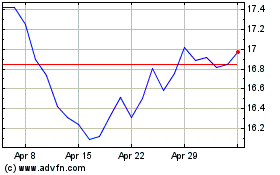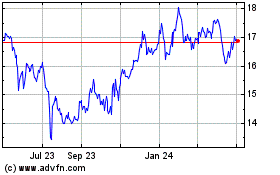Antitrust case against AT&T'sthe $85 billion deal for media
companyTime Warner opens in D.C. court
By Brent Kendall and Drew FitzGerald
This article is being republished as part of our daily
reproduction of WSJ.com articles that also appeared in the U.S.
print edition of The Wall Street Journal (March 23, 2018).
WASHINGTON -- The Justice Department and AT&T Inc. traded
legal jabs Thursday as a federal judge opened proceedings on
whether the telecom giant's planned purchase of Time Warner Inc.
violates antitrust laws.
U.S. District Judge Richard Leon said little while the
government and the companies spent about 90 minutes of opening
arguments attacking the opposing side's legal position.
The Justice Department, which is seeking to block the $85
billion deal, said the merger could mean at least $400 million in
pay-TV price increases because AT&T, which owns the DirecTV
satellite service, would have newfound marketplace leverage if it
folds in Time Warner's stable of programming, including the Turner
networks and HBO.
"If the merger goes forward, consumers all across America will
be worse off as a result," said Justice Department lawyer Craig
Conrath.
AT&T and Time Warner lawyer Daniel Petrocelli called the
government's claims "preposterous" and "dead wrong," saying the
case was simple because the Justice Department couldn't offer proof
that the deal would lessen competition.
"It is a case where there is only one just, clear-cut outcome,
and that is to deny the government's case to block this historic
merger," Mr. Petrocelli said.
The fireworks came on the first official day of a trial that
could take six to eight weeks.
People lined up in snow-covered D.C. early Thursday morning for
a chance to witness the start of the proceedings. The crowd filled
two courtrooms and included the companies' chief executives,
AT&T's Randall Stephenson and Time Warner's Jeff Bewkes, as
well as U.S. antitrust chief Makan Delrahim.
Both sides used their opening presentations to emphasize key
points they made in written legal briefs submitted ahead of the
trial. They also revealed new details for the first time publicly
and hinted at their strategic focus.
The Justice Department argued a post-merger AT&T would use
Turner's valuable channels to wring higher prices out of rival
cable providers who need that programming for their packages. The
government also argued AT&T would try to deter emerging online
rivals who are offering pay-TV packages at cheaper prices.
Mr. Conrath highlighted Dish Network Corp.'s Sling TV, a new
online-only TV package that competes against AT&T's DirecTV Now
streaming service, as proof of Time Warner's importance. He said
Turner chief John Martin warned a Sling TV executive the service
would be "crap" if it didn't carry Turner's networks. (Mr. Conrath
said Mr. Martin used a more profane word best kept out of the
courtroom.) Sling TV today offers two basic $20-a-month TV
packages, both of which carry Turner channels.
Google's YouTube TV offered more proof of Turner's power, the
Justice Department lawyer said. The cable-like streaming service
launched last year without channels like CNN, TBS and TNT. "Guess
what happened next. It turned out that apparently launching without
Turner content didn't work out that well," Mr. Conrath said, and
YouTube TV added them to the package in February.
AT&T's Mr. Petrocelli, in turn, said the deal would allow
the companies to compete better with major online rivals and to
offer a more attractive advertising platform that tailors
commercials to specific viewers based on their interests and
preferences.
The platform would bring in new ad dollars and relieve higher
pricing pressures on consumer pay-TV packages, Mr. Petrocelli
said.
Withholding Turner content from rivals would be "ruinous" for
the newly merged company because it would mean less revenue, Mr.
Petrocelli said. He also objected to Justice Department claims that
a post-merger AT&T, along with Comcast Corp., could act in
tandem to put a stranglehold on the industry and slow the
innovation that has upended the traditional cable business
model.
Mr. Petrocelli spent a considerable portion of his presentation
attacking the Justice Department's economic calculations that
assert the deal would lead to higher prices, a signal that AT&T
believes the two sides' competing math could be crucial in the
case.
After opening arguments, the government began presenting its
case, calling Cox Communications Inc. negotiator Suzanne Fenwick as
its first witness.
The regional cable company executive said a combined
AT&T-Time Warner would have worrisome leverage to force Cox to
pay more for Turner programming and accept unfavorable
conditions.
"We are very concerned that we are going to get presented with a
horribly ugly deal," Ms. Fenwick said. And if Cox can't get a new,
fair deal to carry Turner, "we think we're going to lose a lot of
customers," she added.
Mr. Petrocelli in cross-examination questioned Ms. Fenwick's
motives and suggested Cox had attempted to use the antitrust review
process to extract better terms for carrying Turner than it had
been able to win from Time Warner in negotiations.
The AT&T lawyer also accused the Cox executive of offering
opinions without any evidence to back them up. "You've never done a
single bit of quantitative analysis," he said.
Proceedings will continue Monday with two witnesses, Warren
Schlichting, president of Sling TV at Dish Network, and Turner's
Mr. Martin.
Write to Brent Kendall at brent.kendall@wsj.com and Drew
FitzGerald at andrew.fitzgerald@wsj.com
(END) Dow Jones Newswires
March 23, 2018 02:47 ET (06:47 GMT)
Copyright (c) 2018 Dow Jones & Company, Inc.
AT&T (NYSE:T)
Historical Stock Chart
From Aug 2024 to Sep 2024

AT&T (NYSE:T)
Historical Stock Chart
From Sep 2023 to Sep 2024
